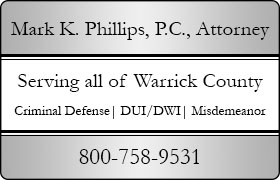 Petersburg Misdemeanor Lawyers, Indiana
Petersburg Misdemeanor Lawyers, Indiana
Sponsored Law Firm
-
 x
x

Click For More Info:
-
Law Offices of Mark K. Phillips
114 South Third Street P.O. Box 427 Boonville, IN 47601» view mapDUI-DWI, Criminal Defense, Personal Injury Top Rated Indiana DUI Defense Lawyer
I offer passionate, loyal and fierce representation. I have over 20 years of experience to fight your Indiana DUI charge. I offer a free, initial consultation.
800-291-416 -
- Contact
- Free Consultation
- Visit:
- Website
- Profile
Not enough matches for Petersburg Misdemeanor lawyer.
Below are all Petersburg Criminal lawyers.
Sponsored Lawyers
1-9 of 9 matches
DUI-DWI, Criminal, Personal Injury, Family Law, Accident & Injury
I am the proud father of three wonderful young men, two of whom are now in practice with me, and the youngest, who is a junior in high school, who have the best characteristics of their mother, who I have been married to for almost 30 years. I am an aggressive lawyer who vigorously defends the rights of those accused. I am relentless in pursuing truth and justice and believe that all people are entitled to the protections of the Constitution and the Laws that govern our way of life. I have been defending people for 21 years after starting as a deputy prosecutor. I have a diverse criminal practice but find particular challenge in successfully fighting Dui/Dwi cases throughout Indiana. We also are civil and criminal trial lawyers.
(more)


 Mark K. Phillips Boonville,Indiana
Mark K. Phillips Boonville,Indiana About UsMark K. Phillips
About UsMark K. Phillips Contact UsCall or Email Now
Contact UsCall or Email Now

